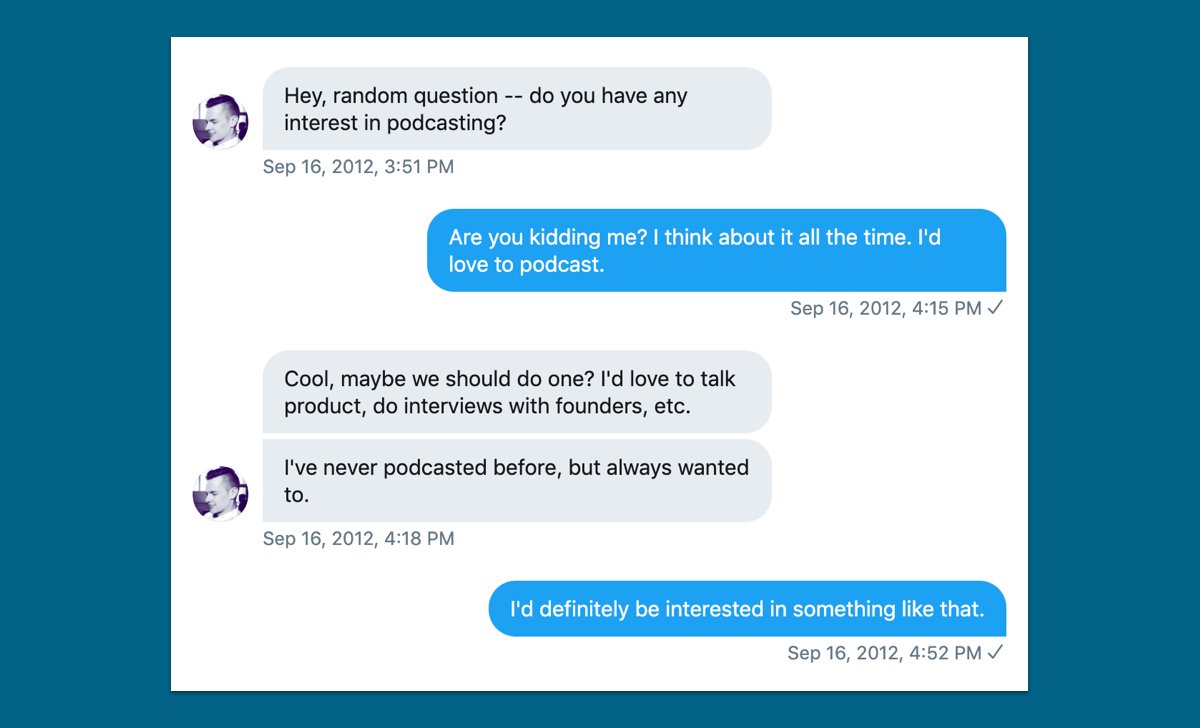
On Sep 12, 2012, @kylefox sent me a DM that changed my life forever.
It resulted in me changing my career, earning more money, meeting most of my current friends, growing an audience online, and (ultimately) building @TransistorFM.
Kyle asked if I wanted to start a podcast.
It resulted in me changing my career, earning more money, meeting most of my current friends, growing an audience online, and (ultimately) building @TransistorFM.
Kyle asked if I wanted to start a podcast.

I should mention: Kyle and I had only hung out a few times in-person.
I'd recently moved away from Edmonton, and hadn't talked to him in a few months.
If he hadn't taken the initiative to reach out, my life might have turned out a lot different! 😜
I'd recently moved away from Edmonton, and hadn't talked to him in a few months.
If he hadn't taken the initiative to reach out, my life might have turned out a lot different! 😜
Initially, we thought it'd be a podcast about Product Management (we were both PMs at the time).
But, it quickly became clear that we were both interested in building and launching our own products.
(This was the 🌱 of things to come)
But, it quickly became clear that we were both interested in building and launching our own products.
(This was the 🌱 of things to come)

We decided to call the podcast "Product People."
Kyle made the artwork, and we started planning our initial episodes.
(Check out our list of "celebs" we wanted to interview! 😜)
Kyle made the artwork, and we started planning our initial episodes.
(Check out our list of "celebs" we wanted to interview! 😜)

Neither of us started with a good microphone.
We recorded our first call on Skype using our Apple headphones.
You can still listen to it here:
share.transistor.fm/s/e7004e88
We recorded our first call on Skype using our Apple headphones.
You can still listen to it here:
share.transistor.fm/s/e7004e88
Podcasting opened up my world.
Through the show, I was able to connect with the most incredible people. Many of these people became my friends.
These connections lead me to almost every opportunity that's come my way.
Through the show, I was able to connect with the most incredible people. Many of these people became my friends.
These connections lead me to almost every opportunity that's come my way.

(Kudos to @patio11 for agreeing to be my first guest ever. I was very nervous. I remember waking up at 5am that day to prepare for our call at 7am)
"Podcast serendipity:"
I interviewed @SachaGreif, which lead to @nathanbarry, and then @pjrvs. The 3 of us did an episode together.
@chasewreeves listened and reached out.
1 year later, @chasewreeves introduced me to @jonbuda.
4 years later, Jon and I started @TransistorFM.
I interviewed @SachaGreif, which lead to @nathanbarry, and then @pjrvs. The 3 of us did an episode together.
@chasewreeves listened and reached out.
1 year later, @chasewreeves introduced me to @jonbuda.
4 years later, Jon and I started @TransistorFM.

• • •
Missing some Tweet in this thread? You can try to
force a refresh


